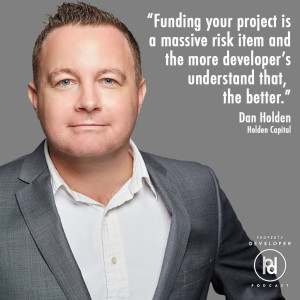Podcast: Play in new window | Download
Subscribe: RSS | Listen to the Property Developer Podcast
Finding ways to access funding and being more creative with your cash are two key elements of any successful property developing business, and keeping the money flowing is critically important. Today’s guest is the founder of Australia’s number 1 commercial finance brokerage, Dan Holden from Holden Capital and he shares how elite developers structure their finance.
We cover some really interesting content related to project finance, and I think you will find it helpful for reflecting on where you are now and where you want to get to, and how you can map that financial journey out a bit more.
We talk about some sophisticated funding solutions that are available to help you stretch your money further, ways property developers can manage their cashflow, the importance of understanding your business model, how you can strategically plan your funding needs, and how to avoid problems that bring developers unstuck.
“Funding your project is a massive risk item and the more developer’s understand that, the better.” Dan Holden
Property Development Training
If you are interested in learning the fundamentals of property development, in your own time and at your own pace, then be sure to head over to www.propertydevelopertraining.com and take a look. I take you step by step through the development process so you know exactly what is needed to find a site, run a feasibility and complete a small scale property development, be that a duplex or 3 or 4 unit site. The training includes a bonus program called Taking It To The Next Level for people who may want to go into developing full-time, along with another bonus course called Raising Capital which covers how to raise money for your projects.
So head over to propertydevelopertraining.com and take a look… I would love to see you on the inside…
Property Developer Quiz
Keen to find out how ready you might be to become a developer? Then take the Property Developer Quiz (https://www.propertydevelopertraining.com/quiz) and get a sense of where you are at…
Become a Million Dollar Property Developer
 Grab my book Become a Million Dollar Property Developer about my journey into property development. This book is ideal for anyone who intends to get into small-scale property development and wants an insider’s guide to successfully obtaining wealth, fulfilment, and glory.
Grab my book Become a Million Dollar Property Developer about my journey into property development. This book is ideal for anyone who intends to get into small-scale property development and wants an insider’s guide to successfully obtaining wealth, fulfilment, and glory.
In this book, Justin will share how he succeeded in delivering a 20-townhouse project on his first property development project and what he learned along the way.
Many people have a dream of becoming a property developer. They aspire to build properties, grow portfolios, and amass great wealth. However, many people often struggle with making the leap into property development.
This book has the answers for how you can make the leap into property development. Grab your copy now.
Social Connection
Property Developer Podcast Facebook – https://www.facebook.com/propertydeveloperpodcast
Property Developer Podcast Instagram – https://www.instagram.com/property_developer_podcast/
Property Developer Podcast LinkedIn – https://www.linkedin.com/company/property-developer-podcast
Dan Holden’s Cash Flow Strategies for Property Developers
1. Include a development management fee
By including a development management fee into your project feasibility, you allow yourself to receive income during the project lifecycle. In many instances, the first mortgage construction finance provider will allow a periodic development management fee to be advanced from the loan as part of the professional fees but remember that it needs to be kept reasonable, reflecting your contribution to the project.
2. Access an Equity Redraw
Be smart and replace some your equity during the project lifecycle. How and when you utilise your capital can greatly reduce the demand on your cash flow and it is important to remember that in most instances, project risk reduces as the project progresses. It therefor follows that the earlier in the project timeline that you borrow money, the more expensive that money will be.
Obviously, the most capital-efficient way would be to use other people’s money (OPM) as much as possible, however that comes at a cost and delaying the point in time when you utilise OPM will reduce this cost.
3. Schedule projects efficiently
Try to get a pipeline of projects in the planning, pre-sale and construction phases. If you only have enough equity to develop one project at a time the ability to maintain a consistent flow of projects and resultant profits is significantly reduced. By taking advantage of the above principals you may be able to make an “equity redraw” and introduce OPM to replace some of your existing equity once you have secured the development approval and some pre-sales. This will then allow you to utilise the capital released to secure your next project without having to wait until the current project is completed.
This approach leverages your equity to make it work more efficiently as well as bringing forward the income streams for future projects and there for improving your cashflow by shortening the timing between project completions and the resultant profits.
4. Negotiate your settlement terms
During the early stages of a typical development project lifecycle, the most capital-intensive part will be the settlement of the development site. By negotiating favourable settlement terms, you can potentially delay paying for the property until you have substantially removed the approval risks associated with it. This in turn will improve the funding costs and the project cash flow in general.
5. Have a safety net by diversifying your profits
If possible, have another business that you can operate in parallel with the development operations. This applies more to smaller businesses that are largely undertaking one project as a time and do not have the capital to smooth out the resultant cash flow lumpiness. Having a small income generating business that requires minimal capital and operating overheads such as a real estate rent roll, small equipment hire business or similar means that when the market is in a serious downturn and you need to be able to just “sit on the beach” and wait it out, this alternative income can be a real godsend.
6. Keep your overheads low
A very effective strategy many small to medium size Developers use is to engage a multitude of project-specific consultants. By doing this, those consultants are a direct cost to a specific project and the developer avoids carrying ongoing salaries as part of their overheads. In some instances there is also the potential to delay some of the payment for the costs involved to coincide with project milestones further improving the project cashflow.
Problems developers should avoid with real estate development
1. Leaving funding until too late
2. Indecision
3. Lack of broad skills
4. Leverage time, money and skill
Lessons about property development finance
1. Understand your business model and use it to plan out your funding needs
You may need to look beyond loans from major banks to fund your future projects. The funds may be a blend of bank money, private capital, mezzanine finance, preferred equity or stretch senior debt, and you may find that accessing alternative funding may in fact accelerate your ability to complete projects. Having an open mind to paying a higher cost for capital may in fact improve your pipeline of projects and still maintain a good profit margin.
2. Leverage your key resources
Dan talked about maximising your resources of time, money and skills so that you get better results. Maybe you need to hire someone to delegate tasks to free up time, or leverage options to stretch your capital like an equity redraw or engage professionals to manage your project or provide advice. So find those ways of freeing your capacity to focus on the overall direction of the business and to do the things you are best at, and ultimately get to where you want to be, faster.
3. Treat funding is a risk item
I think Dan’s suggestion of viewing funding as a risk item is a very good point. If you are regularly assessing and monitoring it you can stay on top of any issues before they get out of hand, or in fact make better use of funding options and your own cash. I’m sure if you were assessing and reviewing your funding risks on a monthly or quarterly basis, you would inevitably become more familiar with your needs, exposure and options. And from that work out some strategic options for how you use capital.
Dan also mentioned the construction funding dictionary they have put together (http://www.holdencapital.com.au/wp-content/uploads/2015/06/Dictionary-Digital-3.pdf). I have read through it and think it is really useful, so take a look at it.
Otherwise head over to the Holden Capital website which is www.holdencapital.com.au, and under the News tab is a range of useful articles and resources.
Don’t forget to connect with me on Instagram via Property Developer Podcast where I share lots of photos of development sites and projects that I come across.
Until next time, may all your funding applications be successful…
Links
Holden Capital – http://www.holdencapital.com.au/
Property Developer Podcast on Instagram – https://www.instagram.com/property_developer_podcast



